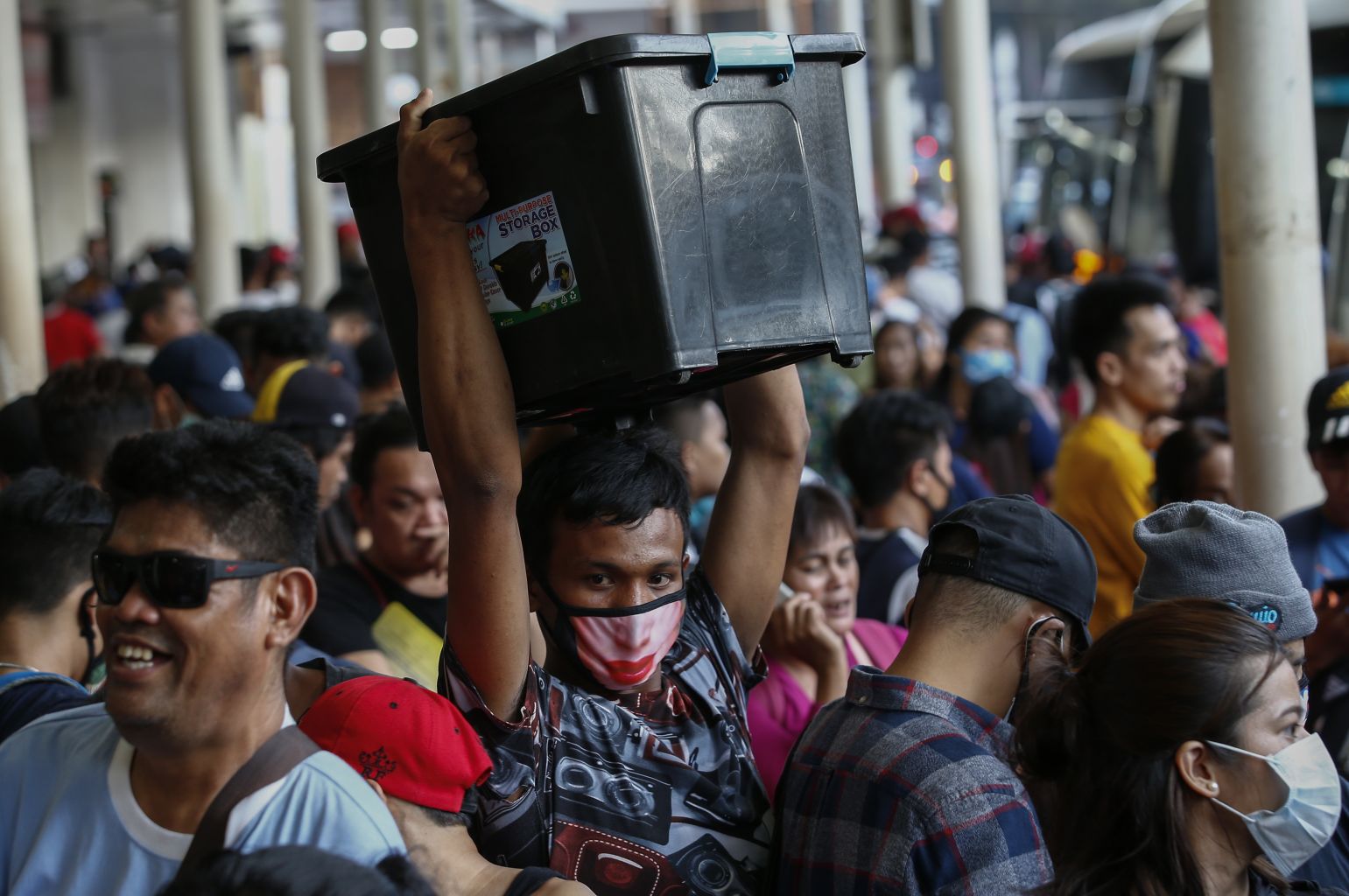Coronavirus: Manila lockdown stirs panic; unclear how it will be implemented
Sign up now: Get insights on Asia's fast-moving developments

A traveller at the Araneta bus depot carries his belongings through a crowd of other travellers hoping for a bus ride out of the capital region before a community quarantine takes effect.
PHOTO: EPA-EFE
MANILA - Panic, confusion and despair. These were the emotions that ran through millions of Filipinos who would have to live through a sweeping, month-long lockdown of the Philippines' sprawling capital region.
Over the past two days, groceries, supermarkets, malls and convenience stores have been packed with buyers eager to secure their share of essentials before the lockdown takes effect at midnight on Sunday (March 15).
Rubbing alcohol and disinfectants quickly disappeared from shelves. Shoppers were also snapping up rice, canned goods, meat products, bread, milk, cup noodles and toilet paper.
Queues lasted for at least an hour. Some have had to wait in line for three hours.
The thickest crowds were in giant chains such as SM Supermarket and S&R.
Ms Jinky Jorgio, 52, a media consultant, said she got discouraged by the long lines at SM.
"I didn't know how long it will take to queue. All I could do was panic, so I just went to the market to get sweet potatoes and bananas," she said.
Mr Komfie Manalo, 49, a newspaper editor, said people were not panic buying at a market he went to. Still, there was a palpable sense of unease.
"You can experience panic, but not buying. People are still buying only what they need for a few days, or just for the day," he said.
The anxiety is being fuelled by uncertainties.
President Rodrigo Duterte offered scant details as he announced on Thursday (March 12) a measure putting Metro Manila on "community quarantine" for at least a month.
There were unanswered questions, and scepticism over the massive logistics required to enforce the lockdown.
Most centred on how the capital's borders would be sealed, with a huge number of workers and large volumes of goods and trade passing through them each day.
Metro Manila is home to some 13 million people. But 3 million more commute to the capital to work from suburbs just along its fringes.
On Friday (March 13), officials struggled to provide clarity.
Interior Secretary Eduardo Ano said those with jobs or run businesses in Metro Manila but live outside its borders would be allowed to travel freely. But they would have to present their company IDs.
"Work continues," Trade Secretary Ramon Lopez told reporters.
But for those relying on informal economy, he said, "Just take your business elsewhere."
Brigadier-General Debold Sinas said over 20,000 policemen would man checkpoints along key roads and highways leading to Metro Manila.
It remained unclear, though, how screenings would be done at these checkpoints, with many anticipating massive traffic jam if everyone going in would need to have their IDs and body temperature checked.
Brig-Gen Sinas said he recommended to an inter-agency task force, which oversees the response to the outbreak, to suspend all public transport going in and out of Metro Manila.
"How could you control the flow if you let all buses, vehicles in? The purpose is to restrict movement," he said.
His proposal would have all commuters disembark at the checkpoints, have themselves screened, and then take public transport operating from within Manila to their offices.
The flow of dry goods, farm produce and other essential supplies would be unimpeded.
"The importance of that is to ensure continuity of supply and discourage panic buying. We can assure you we can replenish stocks. Your wallet will be depleted first before we run out of rubbing alcohol," said Mr Lopez.
However, for some, there are immeasurable personal and emotional toll.
Couples separated by Metro Manila's borders are fretting over having to be separated for a month.
"There's still Facetime," said Ms Marivic Sangalang, 23, a graphics designer, who lives in Metro Manila, but whose partner lives in a city just south of the capital.
The government is also advising those already engaged to either postpone or scale down their wedding celebrations.
"You can't stop love, but they can trim their guest list. But it's best if they just move their wedding to another date, and demand a refund of their down payments," said Mr Lopez.
Still, there are a few who see a silver lining amid the gloom.
Classes have been suspended at all levels, and school-age children and teens have been told to stay home.
Some parents have been sent on work-from-home arrangements.
"I now have more time with my baby because I do away with the travel time… I also get a chance to actually catch her awake more often," said Ms Abigail Ho-Torres, 39, a communications specialist.
Yoga teacher Johnna Giolagon, 44, said she has more time for herself.
"I don't have to get up at 4am just to prepare for the school day. I still wake up at 4am because of my body clock. But at least I don't need to get up," she said.


